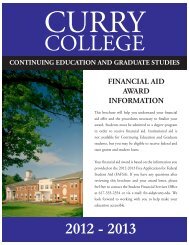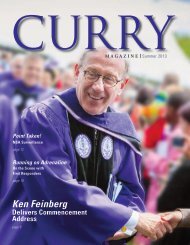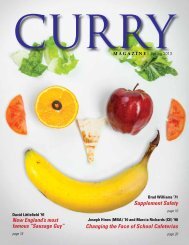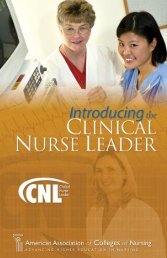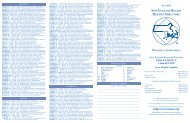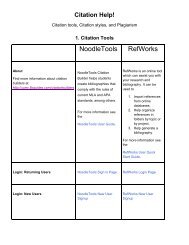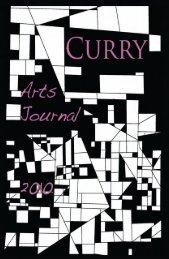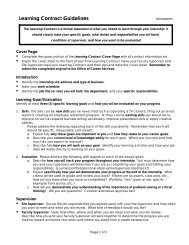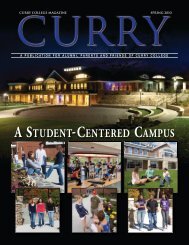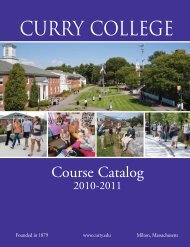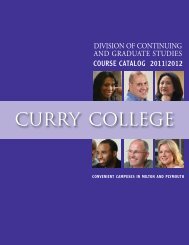Read the Curry College NEASC 2012 Self-Study Report.
Read the Curry College NEASC 2012 Self-Study Report.
Read the Curry College NEASC 2012 Self-Study Report.
Create successful ePaper yourself
Turn your PDF publications into a flip-book with our unique Google optimized e-Paper software.
26<br />
• MACJ: Police Career Incentive Pay Program (PCIPP)<br />
• MBA: Association to Advance Collegiate Schools of Business (AACSB).<br />
Each of <strong>the</strong> graduate programs gives students a mastery of complex issues within its field,<br />
challenging students at advanced intellectual and performance levels (see Catalog and Web<br />
program and curriculum descriptions). Each also incorporates capstone or embedded<br />
experiences, listed below, that underscore and reinforce <strong>the</strong>ir identity and priorities, student<br />
learning goals, and <strong>Curry</strong>’s mission:<br />
• MSN –Evidence and clinical application including quality and safety issues;<br />
• MACJ – Thesis‐based on <strong>the</strong> reflective practitioner;<br />
• M.Ed. – Practice in <strong>the</strong> field including classroom research;<br />
• MBA –Team‐leading and a practice‐oriented capstone involving an au<strong>the</strong>ntic consulting<br />
project for an area business.<br />
In each program, Master’s degree candidates gain a broad conceptual understanding of <strong>the</strong><br />
field as well as specific knowledge, skills, and competencies that streng<strong>the</strong>n <strong>the</strong>ir professional<br />
preparation for advanced practice within <strong>the</strong>ir fields of study. The curricular sequences,<br />
documented both in print and online, illustrate <strong>the</strong> sequential development of learning that<br />
accomplishes each program’s learning goals. Each program utilizes specific learning outcomes<br />
to guide student learning and assessment of achievement. The area reports and <strong>the</strong> utilization<br />
of data to inform curricular decision‐making has increased significantly (see section below on<br />
Learning Outcomes Assessment). Curricular changes to improve student learning are considered<br />
each academic year based on student outcomes on certification exams, where applicable;<br />
accreditation modifications; faculty review of student outcomes; student evaluation feedback;<br />
and data that documents <strong>the</strong> nature of graduate students’ learning.<br />
The Graduate Studies Division has been forward‐thinking regarding instructional delivery<br />
methods for adult students. Recognizing <strong>the</strong> potential benefits of hybrid learning for increasing<br />
student achievement, a Hybrid Learning Task Force worked during 2010‐2011 to examine<br />
matters of pedagogy and practice, including resources for technological support, faculty<br />
development, and student service. lvi Since that report, progress in advancing hybrid models has<br />
been seen in:<br />
• New course offerings in Criminal Justice, Communication, and Management courses,<br />
with additional offerings under development in Education and Nursing.<br />
• Faculty training that has included both online resources and on‐site, faculty cohortbased<br />
training and curriculum development retreats.<br />
• A redesigned Master in Criminal Justice program serving as a model for o<strong>the</strong>r programs<br />
seeking to develop additional hybrid components.<br />
The technological infrastructure necessary to support web‐based learning has increasingly<br />
become an issue as <strong>Curry</strong> moves fur<strong>the</strong>r in this direction. (This is discussed fur<strong>the</strong>r within <strong>the</strong><br />
Appraisal section.)<br />
<strong>Curry</strong> <strong>College</strong> <strong>2012</strong> <strong>Self</strong>-<strong>Study</strong><br />
Standard Four




